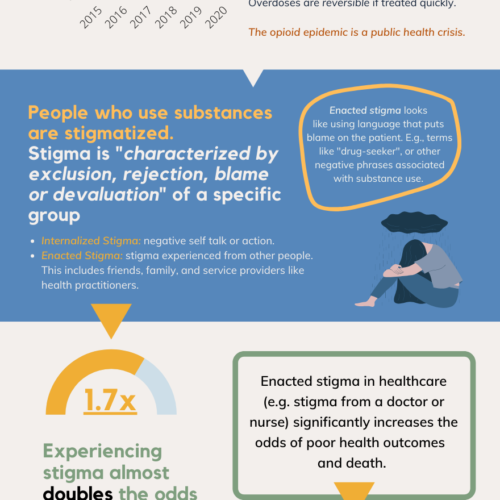Understanding stigma towards people who use substance users and its negative health impacts in order to support nurses in delivery of care for vulnerable patients.
Supporting Nurses Whose Patients Use Substances
Quick Facts:
- Individuals are less likely to seek support for use of opioid and non-opioid substances due to stigma and negative attitudes
- Ongoing opioid crisis: Nearly 6000 deaths and over 35,000 overdoses total in Ontario alone since 2015 due to opioids
- Experiencing stigma is associated with a significantly higher risk of experiencing an overdose – even more so from experiencing outside (enacted) stigma as opposed to internalized stigma
- In Wellington-Guelph, there is evidence that fewer people experiencing overdose access the emergency room or hospital, in part due to stigma experienced in said environments
Educational Infographics
These infographics represent the key information points and most up to date knowledge on stigma and substance use in a healthcare setting based on a review of a literature and copious feedback from community nurses, additional healthcare practitioners, and people with lived experience of substance use.
Literature Review - Key Messages
The following key messages were drawn from a literature review on stigma and substance use, indicating stigma experienced by people who use substances is a prominent public health issue. Please scroll down to see links to the literature.
- Stigma against people who use substances is harmful. It contributes to an increased risk of overdose and death by creating both systemic and individual barriers to addressing issues.
- There is evidence to support that patients who use substances experience harmful stigma from healthcare providers and in healthcare settings and this may impact service delivery and risk of overdose and death.
- Healthcare providers feel they are not receiving adequate education, training, and support in the workplace for working with vulnerable populations including those who use substances.
- Anti-stigma programming that focuses on education and positive messaging has shown to be effective in the short run of improving attitudes and may improve service experience for those who use substances.
Stigma and Drug Use - What is the Problem?
- Stigma has negative effects on both the mental and physical health of drug users including but not limited to increased anxiety and depression, decreased willingness to seek out support, and increased risk of overdose and death.
- Research indicates many drug users face stigma in healthcare settings which prevented them from seeking out care
- Health professionals may lack support and training within the workplace for working with drug users and those experiencing overdoses
- Language associated with drug users makes an impact on stigma: certain language (e.g. “drug addict”) further stigmatizes those who use drugs and “may affect the delivery of patient care.”
RESOURCES SECTION
Resources for Nurses and Other Healthcare Practitioners
- RNAO Guidelines for Engaging Clients who use Substances
- Free training through Moodle course modules to engage patients with mental health and substance use
- Hamilton Drug Strategy’s brilliant videos showing a first person perspective of stigma in healthcare:
- Toronto Public Health on the importance of language
- Support Not Stigma Video (Christina Hughes)
- Marginalization and Stigma Videos
- Support Not Stigma Overdose Awareness Day 2020





